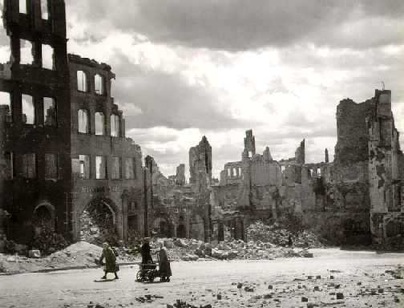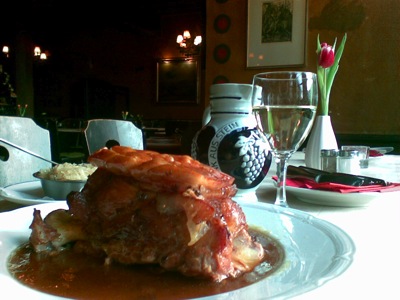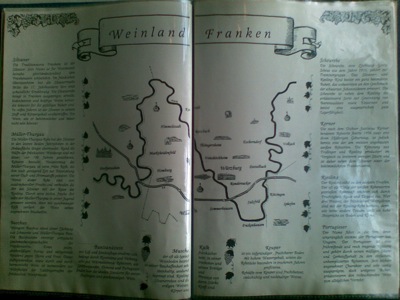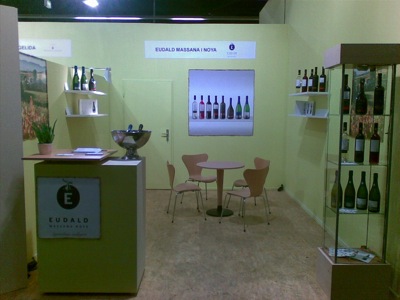The Wine Merchant in Nürnberg (2)
22/02/09 13:54 |
The Wine
Merchant | Permalink
Nürnberg
– ‘Die
Bratwurst-Metropole’.
‘Die Bewohner der alten Noris im Herzen Frankens sind seit eh und je dafür bekannt, einen guten Bratwurst abgeneigt zu sein.’
Nürnberg was almost completely destroyed at the end of the second World War. Today there is (almost) no building left in original construction. Which gives a strange feeling in old Europe. You could compare it with Rotterdam, which was raised again after the War.
“War. What is it good for? Absolutely nothing. Say it again: WAR!” (cfr Springsteen)

In the centre of the city, on the bank of the river Pegnitz, stands the Heilig-Geist-Spital (Hospital of the Holy Spirit). Founded in 1332, this is one of the largest hospitals of the Middle Ages. Lepers were kept here at some distance from the other patients.
It now houses a very typical Frankish restaurant. I love to discover local kitchen and wines when I travel and this definitely is a ‘must’ when you visit Nürnberg. You feel like hanging above the river when you look through the small yellow windows from a heavy wooden table. The food is traditional and authentic, I go for a pork shoulder which is prepared delicious, even the fat comes off crispy and savoury.

Almost all the wines are served by 50 cl carafe. In the menu there’s an extensive explanation of the typical varietals from this area: Silväner, Muller-Thurgau, Bacchus, Scheurebe, Kerner, Riesling and Portugieser. Varieties well known and varieties I never heard about. They also give information on the different soils: Buntsandstein, Musche Kalk and Keuper.

In my hotel I saw a documentary on CNN of wine making in Napa Valley where the philosophy seems to go against tradition. A successful young wine maker said that just because in Napa there are no restrictions whatsoever on winemaking they can go wild in designing new wines with any variety you want on any soil. He said that it’s better to take a new original road which is much more interesting in life than the traditional roads we know in Europe.
When I see than a wine region like ‘Weinland Franken’ where they have been perfecting winegrowing and style over the last hundred years I am very well impressed. This is a wine country!
I believe in Napa Valley they confuse wine making with something exciting to play with. They come up with the strangest wines that might have success if well promoted with new marketing techniques. But will they last? Do we need new, completely different wines, or do we need equilibrated wines made with many years of experience, wines that come to perfection according to their climate, soil and variety?
My wine mentor Joan Mila told me once:
“ In a ‘top’ wine you shouldn’t be able to distinguish the different varieties, if you do it is a defect of the wine.”
This is for me the ultimate concept of wine making. The perfect harmony of taste. Wine is to enjoy and it is the wine makers duty to combine all parameters of nature and merge them into one beautiful result that makes you feel like in heaven.
‘Die Bewohner der alten Noris im Herzen Frankens sind seit eh und je dafür bekannt, einen guten Bratwurst abgeneigt zu sein.’
Nürnberg was almost completely destroyed at the end of the second World War. Today there is (almost) no building left in original construction. Which gives a strange feeling in old Europe. You could compare it with Rotterdam, which was raised again after the War.
“War. What is it good for? Absolutely nothing. Say it again: WAR!” (cfr Springsteen)

In the centre of the city, on the bank of the river Pegnitz, stands the Heilig-Geist-Spital (Hospital of the Holy Spirit). Founded in 1332, this is one of the largest hospitals of the Middle Ages. Lepers were kept here at some distance from the other patients.
It now houses a very typical Frankish restaurant. I love to discover local kitchen and wines when I travel and this definitely is a ‘must’ when you visit Nürnberg. You feel like hanging above the river when you look through the small yellow windows from a heavy wooden table. The food is traditional and authentic, I go for a pork shoulder which is prepared delicious, even the fat comes off crispy and savoury.

Almost all the wines are served by 50 cl carafe. In the menu there’s an extensive explanation of the typical varietals from this area: Silväner, Muller-Thurgau, Bacchus, Scheurebe, Kerner, Riesling and Portugieser. Varieties well known and varieties I never heard about. They also give information on the different soils: Buntsandstein, Musche Kalk and Keuper.

In my hotel I saw a documentary on CNN of wine making in Napa Valley where the philosophy seems to go against tradition. A successful young wine maker said that just because in Napa there are no restrictions whatsoever on winemaking they can go wild in designing new wines with any variety you want on any soil. He said that it’s better to take a new original road which is much more interesting in life than the traditional roads we know in Europe.
When I see than a wine region like ‘Weinland Franken’ where they have been perfecting winegrowing and style over the last hundred years I am very well impressed. This is a wine country!
I believe in Napa Valley they confuse wine making with something exciting to play with. They come up with the strangest wines that might have success if well promoted with new marketing techniques. But will they last? Do we need new, completely different wines, or do we need equilibrated wines made with many years of experience, wines that come to perfection according to their climate, soil and variety?
My wine mentor Joan Mila told me once:
“ In a ‘top’ wine you shouldn’t be able to distinguish the different varieties, if you do it is a defect of the wine.”
This is for me the ultimate concept of wine making. The perfect harmony of taste. Wine is to enjoy and it is the wine makers duty to combine all parameters of nature and merge them into one beautiful result that makes you feel like in heaven.
|
The Wine Merchant in Nürnberg (1)
19/02/09 22:09 |
The Wine
Merchant | Permalink
Organic
wines: Marketing or idealism ?
I’m at the Biofach World Organic Trade Fair (where organic people meet) presenting wines and cava from Eudald Massana Noya, Penedès.
Eudald is the 9th generation in his family that are true to organic agriculture. Eudald never learned anything else. He saw his father and grand father working without herbicides and learned about biodynamic when he was a child.
What is the main reason to produce organic wines ? To sell more ? To add an extra value to your wines ? Or is it a philosophy, a way of living. Being sensitive to nature and your health ?

Years ago organic agriculture was associated to hippies that grew their own vegetables and walked around in woollen self made socks. Today nobody knows anymore what kind of artificial additives (E-&hellip are in food and beverage. And why
it would be a problem for your health.
are in food and beverage. And why
it would be a problem for your health.
Here at the Biofach world’s most important organic fair you can see clearly that being sensitive to organic products is a way of living. People need to get back to basics. The luxury of finding at your corner a world food supermarket has been replacing the local farmer that provides you with food from your area. The popular 'slow food' movement is bringing people back to their earth, their surrounding nature and ‘terroir’ where they live on.
And what about biodynamic viticulture ? A knowledge as ancient as the human being. The influence of the moon, the sun, energy streams and magnetic fields.

A while ago somebody asked Joan Mila what he thinks about biodynamic wine making. Here is his answer:
“I remember once I was in a Crypt in Toulouse about five years ago where I saw a bunch of biodynamic wine makers scratching their back against the central pillar that was bearing the construction. According to them this would bring positive energy to their wine fields.” No further comment.
I’m at the Biofach World Organic Trade Fair (where organic people meet) presenting wines and cava from Eudald Massana Noya, Penedès.
Eudald is the 9th generation in his family that are true to organic agriculture. Eudald never learned anything else. He saw his father and grand father working without herbicides and learned about biodynamic when he was a child.
What is the main reason to produce organic wines ? To sell more ? To add an extra value to your wines ? Or is it a philosophy, a way of living. Being sensitive to nature and your health ?

Years ago organic agriculture was associated to hippies that grew their own vegetables and walked around in woollen self made socks. Today nobody knows anymore what kind of artificial additives (E-&hellip
Here at the Biofach world’s most important organic fair you can see clearly that being sensitive to organic products is a way of living. People need to get back to basics. The luxury of finding at your corner a world food supermarket has been replacing the local farmer that provides you with food from your area. The popular 'slow food' movement is bringing people back to their earth, their surrounding nature and ‘terroir’ where they live on.
And what about biodynamic viticulture ? A knowledge as ancient as the human being. The influence of the moon, the sun, energy streams and magnetic fields.

A while ago somebody asked Joan Mila what he thinks about biodynamic wine making. Here is his answer:
“I remember once I was in a Crypt in Toulouse about five years ago where I saw a bunch of biodynamic wine makers scratching their back against the central pillar that was bearing the construction. According to them this would bring positive energy to their wine fields.” No further comment.